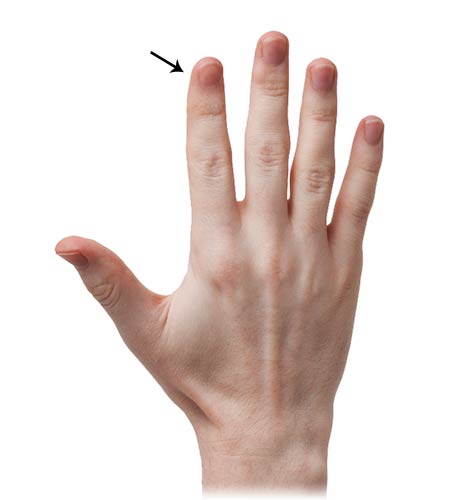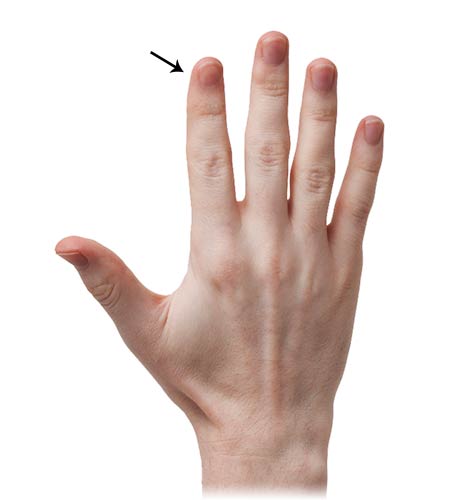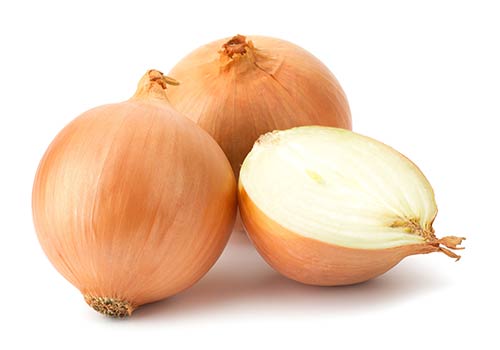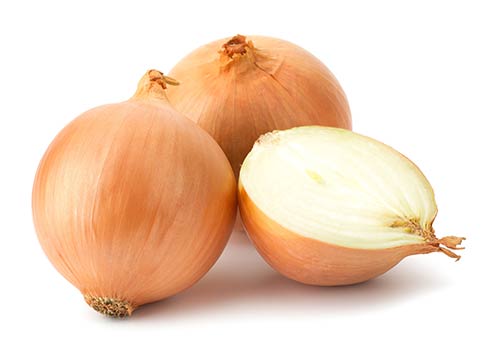finger
Any of the long, thin, separate parts of the hand, especially those that are not thumbs

انگشت
Don't put your finger in your nose!
انگشت در بينى خود نكن!
Any of the long, thin, separate parts of the hand, especially those that are not thumbs

انگشت
Don't put your finger in your nose!
انگشت در بينى خود نكن!
Oxford Essential Dictionary
finger
noun
one of the five parts at the end of your hand
keep your fingers crossed to hope that somebody or something will be successful:
I'll keep my fingers crossed for you in your exams.
Longman Dictionary of Contemporary English
finger
I. fin‧ger1 S2 W2 /ˈfɪŋɡə $ -ər/ BrE AmE noun [countable]
[Language: Old English]
1. PART OF YOUR HAND one of the four long thin parts on your hand, not including your thumb:
The woman had a ring on her finger, so I assumed she was married.
We ate with our fingers.
run your fingers through/over/along etc something
She ran her fingers through his hair. ⇨ ↑index finger, ↑little finger, ↑forefinger, ↑middle finger, ↑ring finger
2. cross your fingers
a) to hope that something will happen the way you want:
We’re keeping our fingers crossed that she’s going to be OK.
b) to secretly put one finger over another finger, because you are telling a lie – done especially by children:
‘He’s nice,’ said Laura, crossing her fingers under the table.
3. not lift/raise a finger to not make any effort to help someone with their work:
I do all the work around the house – Frank never lifts a finger.
4. put your finger on something to know or be able to explain exactly what is wrong, different, or unusual about a situation:
There was something about the man that worried Wycliffe, but he couldn’t put his finger on it.
5. not lay a finger on somebody to not hurt someone at all, especially to not hit them:
Don’t lay a finger on me, or I’ll call the police!
6. have/keep your finger on the pulse (of something) to always know about the most recent changes or developments in a particular situation or activity:
people who have their finger on the pulse of fashion and pop culture
7. have a finger in every pie/ in many pies to be involved in many activities and to have influence over a lot of people, used especially when you think someone has too much influence
8. twist/wrap/wind somebody around your little finger to be able to persuade someone to do anything that you want:
Ed could wrap his mother around his little finger.
9. the finger of blame/suspicion:
The finger of suspicion immediately fell on Broderick.
10. OF A GLOVE the part of a ↑glove that covers your finger
11. SHAPED LIKE A FINGER anything that is long and thin, like the shape of a finger, especially a piece of land, an area of water, or a piece of food:
fish fingers
chocolate fingers
finger of
the long finger of Chile
12. pull/get your finger out British English informal used to tell someone to work harder
13. put two fingers up at somebody British English informal to show someone you are angry with them in a very offensive way by holding up your first two fingers with the back of your hand facing them
14. give somebody the finger American English informal to show someone you are angry with them in a very offensive way by holding up your middle finger with the back of your hand facing them
15. be all fingers and thumbs British English to use your hands in an awkward or careless way, so that you drop or break things
16. long-fingered/slim-fingered etc having long fingers, slim fingers etc:
lovely long-fingered hands
17. DRINK an amount of an alcoholic drink that is as high in the glass as the width of someone’s finger:
two fingers of whiskey
⇨ ↑butterfingers, ↑fish finger, ⇨ have your hands/fingers in the till at ↑till2(3), ⇨ count something on the fingers of one hand at ↑count1(7), ⇨ have green fingers at ↑green1(10), ⇨ burn your fingers/get your fingers burnt at ↑burn1(16), ⇨ point the/a finger at somebody at ↑point2(9), ⇨ let something slip through your fingers at ↑slip1(15), ⇨ snap your fingers at ↑snap1(7), ⇨ have sticky fingers at ↑sticky(6), ⇨ work your fingers to the bone at ↑work1(29)
Oxford Advanced Learner's Dictionary
finger
fin·ger [finger fingers fingered fingering] noun, verb [ˈfɪŋɡə(r)] [ˈfɪŋɡər]
noun
1. one of the four long thin parts that stick out from the hand (or five, if the thumb is included)
• She ran her fingers through her hair.
• Hold the material between finger and thumb.
• He was about to speak but she raised a finger to her lips.
• The old man wagged his finger at the youths.
see also butterfingers, forefinger, green fingers, index finger, little finger, middle finger, ring finger
2. -fingered (in adjectives) having the type of fingers mentioned; having or using the number of fingers mentioned
• long-fingered
• nimble-fingered
• a four-fingered chord
see also light-fingered
3. the part of a glove that covers the finger
4. ~ (of sth) a long narrow piece of bread, cake, land, etc
• a finger of toast
• chocolate fingers
• a narrow finger of land pointing out into the sea
see also fish finger
more at burn your fingers/get your fingers burnt at burn v., be able to count sb/sth on (the fingers of) one hand at count v., cross your fingers at cross v., not lift/raise a finger/hand (to do sth) at lift v., point a/the finger (at sb) at point v., let sth slip (through your fingers) at slip v., snap your fingers at snap v., have sticky fingers at sticky, be all (fingers and) thumbs at thumb n.
Word Origin:
Old English, of Germanic origin; related to Dutch vinger and German Finger.
Collocations:
Physical appearance
A person may be described as having:
Eyes
(bright) blue/green/(dark/light) brown/hazel eyes
deep-set/sunken/bulging/protruding eyes
small/beady/sparkling/twinkling/(informal) shifty eyes
piercing/penetrating/steely eyes
bloodshot/watery/puffy eyes
bushy/thick/dark/raised/arched eyebrows
long/dark/thick/curly/false eyelashes/lashes
Face
a flat/bulbous/pointed/sharp/snub nose
a straight/a hooked/a Roman/(formal) an aquiline nose
full/thick/thin/pouty lips
dry/chapped/cracked lips
flushed/rosy/red/ruddy/pale cheeks
soft/chubby/sunken cheeks
white/perfect/crooked/protruding teeth
a large/high/broad/wide/sloping forehead
a strong/weak/pointed/double chin
a long/full/bushy/wispy/goatee beard
a long/thin/bushy/droopy/handlebar/pencil moustache/ (especially US) mustache
Hair and skin
pale/fair/olive/dark/tanned skin
dry/oily/smooth/rough/leathery/wrinkled skin
a dark/pale/light/sallow/ruddy/olive/swarthy/clear complexion
deep/fine/little/facial wrinkles
blonde/blond/fair/(light/dark) brown/(jet-)black/auburn/red/(BrE) ginger/grey hair
straight/curly/wavy/frizzy/spiky hair
thick/thin/fine/bushy/thinning hair
dyed/bleached/soft/silky/dry/greasy/shiny hair
long/short/shoulder-length/cropped hair
a bald/balding/shaved head
a receding hairline
a bald patch/spot
a side/centre/(US) center (BrE) parting/ (NAmE) part
Body
a long/short/thick/slender/(disapproving) scrawny neck
broad/narrow/sloping/rounded/hunched shoulders
a bare/broad/muscular/small/large chest
a flat/swollen/bulging stomach
a small/tiny/narrow/slim/slender/28-inch waist
big/wide/narrow/slim hips
a straight/bent/arched/broad/hairy back
thin/slender/muscular arms
big/large/small/manicured/calloused/gloved hands
long/short/fat/slender/delicate/bony fingers
long/muscular/hairy/shapely/(both informal, often disapproving) skinny/spindly legs
muscular/chubby/(informal, disapproving) flabby thighs
big/little/small/dainty/wide/narrow/bare feet
a good/a slim/a slender/an hourglass figure
be of slim/medium/average/large/athletic/stocky build
Example Bank:
• ‘None of that!’ cried the teacher, wagging her finger.
• Although she knew lots of people, she could count her friends on the fingers of one hand.
• Dad started twiddling his fingers nervously.
• Everyone put their fingers in their ears when the shooting started.
• He crooked a finger to tell us to go over to him.
• He gently laced his fingers between mine.
• He held up his hand with the fingers extended.
• He snapped his fingers and the waiter came running.
• He was drumming his fingers nervously on the arm of the chair.
• Her nimble fingers undid the knot in seconds.
• His clumsy fingers struggled with the buttons.
• I dipped my finger in the sauce and licked it.
• I noticed the ring on the third finger of her left hand.
• I stubbed my finger painfully while reaching for a book.
• It's easiest to eat chicken legs with your fingers.
• Sally trailed her fingers in the water idly.
• She hooked her fingers in the belt loop of his jeans.
• She raised a finger to her lips to ask for silence.
• She ran her finger along the dusty shelf.
• She took off his bandages with gentle fingers.
• The child needed treatment after trapping her finger in the car door.
• The enquiry pointed the finger of blame at the driver of the crashed coach.
• The finger of suspicion was pointed at the chicken served for lunch.
• The man drew a finger across his throat in a threatening gesture.
• The nurse pricked my finger to get some blood.
• The ornaments had been put out of reach of the children's prying fingers.
• The protester was jabbing a finger aggressively at a policeman.
• The teacher raised a warning finger and we stopped talking.
• Tina curled her slender fingers into a fist.
• We were swaying and clicking our fingers in time to the music.
Idioms: finger of suspicion ▪ get/pull your finger out ▪ give somebody the finger ▪ have a finger in every pie ▪ have your finger on the pulse ▪ have your fingers in the till ▪ lay a finger on somebody ▪ not put your finger on something ▪ put two fingers up at somebody ▪ work your fingers to the bone
Cambridge Advanced Learner's Dictionary
Cambridge Advanced Learner's Dictionary - 4th Edition
finger / ˈfɪŋ.ɡə r / / -ɡɚ / noun [ C ]
A2 any of the long, thin, separate parts of the hand, especially those that are not thumbs:
He noticed her long delicate fingers.
I cut my finger chopping onions last night.
→ See also forefinger , index finger , little finger , ring finger
a part of a glove (= hand covering) that covers a finger
© Cambridge University Press 2013
Collins COBUILD Advanced Learner’s English Dictionary
finger
/fɪŋgə(r)/
(fingers, fingering, fingered)
Frequency: The word is one of the 1500 most common words in English.
1.
Your fingers are the four long thin parts at the end of each hand.
She suddenly held up a small, bony finger and pointed across the room...
She ran her fingers through her hair...
There was a ring on each of his fingers.
N-COUNT
see also light-fingered
2.
The fingers of a glove are the parts that a person’s fingers fit into.
N-COUNT: usu pl
3.
A finger of something such as smoke or land is an amount of it that is shaped rather like a finger.
...a thin finger of land that separates Pakistan from the former Soviet Union...
Cover the base with a single layer of sponge fingers.
= strip
N-COUNT: N of n, n N
see also fish finger
4.
If you finger something, you touch or feel it with your fingers.
He fingered the few coins in his pocket...
Self-consciously she fingered the emeralds at her throat.
VERB: V n, V n
5.
If you get your fingers burned or burn your fingers, you suffer because something you did or were involved in was a failure or a mistake.
He has had his fingers burnt by deals that turned out badly...
Mr Walesa burned his fingers by promising he would give every Pole 100m zlotys to start a business.
PHRASE: V inflects
6.
If you cross your fingers, you put one finger on top of another and hope for good luck. If you say that someone is keeping their fingers crossed, you mean they are hoping for good luck.
I’m keeping my fingers crossed that they turn up soon.
PHRASE: V inflects
7.
If you say that someone did not lay a finger on a particular person or thing, you are emphasizing that they did not touch or harm them at all.
I must make it clear I never laid a finger on her.
PHRASE: V inflects, usu with brd-neg, PHR n [emphasis]
8.
If you say that a person does not lift a finger or raise a finger to do something, especially to help someone, you are critical of them because they do nothing.
She never lifted a finger around the house...
They will not lift a finger to help their country.
PHRASE: V inflects, with brd-neg [disapproval]
9.
If you point the finger at someone or point an accusing finger at someone, you blame them or accuse them of doing wrong.
He said he wasn’t pointing an accusing finger at anyone in the government or the army.
PHRASE: V inflects, PHR n
10.
If you tell someone to pull their finger out or to get their finger out, you are telling them rudely that you want them to start doing some work or making an effort. (BRIT INFORMAL)
Isn’t it about time that you pulled your finger out?
PHRASE: V inflects [disapproval]
11.
If you put your finger on something, for example a reason or problem, you see and identify exactly what it is.
He could never quite put his finger on who or what was responsible for all this.
PHRASE: V inflects, PHR n/wh
12.
If someone or something slips through your fingers, you just fail to catch them, get them, or keep them.
Money has slipped through his fingers all his life...
You mustn’t allow a golden opportunity to slip through your fingers or you will regret it later.
PHRASE: V inflects
13.
to have green fingers: see green
finger on the pulse: see pulse
Merriam-Webster's Advanced Learner's Dictionary
1fin·ger /ˈfɪŋgɚ/ noun, pl -gers
1 [count] : one of the five long parts of the hand that are used for holding things especially; : one of the four that are not the thumb
• Don't stick your fingers in the cookie batter!
• He slipped the ring onto her finger.
• The baby held onto my thumb with her tiny fingers.
• She ran her fingers through his hair.
• He drummed his fingers on the table impatiently.
- see also forefinger, index finger, little finger, middle finger, ring finger
2 [count]
a : something that is long and thin and looks like a finger
• a finger of land extending into the sea
• a finger of flame
b : the part of a glove into which a finger is placed
3 the finger US informal : an obscene gesture made by pointing the middle finger up, keeping the other fingers down, and turning the palm towards you
• She was so mad, she gave him the finger.
• Some angry driver flipped me the finger on the highway this morning.
all fingers and thumbs informal : very clumsy
• Sorry I dropped the vase; I'm all fingers and thumbs today.
cross your fingers
- see 2cross
finger on the pulse
✦If you have/keep your finger on the pulse of something, you know about the latest things that are happening.
• He claims that he has/keeps his finger on the pulse of the computer industry. [=that he is very aware what is happening in the computer industry]
have a finger in a/the pie : to have an interest or share in something
• a sharp talent agent who has a finger in nearly every pie in show business
itchy finger
- see itchy
keep your fingers crossed
- see 2cross
lay a finger on informal : to touch or hit (someone) - usually used in negative statements
• I don't know what he's complaining about. I never laid a finger on him.
lift a finger : to make an effort to do something - usually used in negative statements
• I have so many chores to do, and my sister won't lift a finger to help me.
• He never lifted a finger to try to improve his failing grades.
point an accusing finger at or point a/the finger at : to accuse or blame (someone)
• He was quick to point an accusing finger at his coworkers.
• Let's stop pointing fingers at each other and just solve the problem!
put/stick two fingers up at someone Brit informal : to make an obscene gesture by holding up the index finger and the middle finger of one hand in the shape of a V while keeping the palm turned inward
put your finger on : to find out the exact nature of (something) : identify
• I feel that something is wrong but I can't quite put my finger on the problem.
the finger of blame/suspicion
- used to say that someone is being blamed or suspected
• He was shocked to realize that the finger of suspicion was now pointed at him. [=that he was now suspected]
work your fingers to the bone : to work very hard
• She had to work her fingers to the bone to make enough money to raise her kids.
wrap (someone) around your (little) finger
- see 1wrap
- fin·gered /ˈfɪŋgɚd/ adj
- used in combination
• three-fingered
- fin·ger·like /ˈfɪŋgɚˌlaɪk/ adj



